|
|
|
Sort Order |
|
|
|
Items / Page
|
|
|
|
|
|
|
| Srl | Item |
| 1 |
ID:
104580


|
|
|
| 2 |
ID:
057920
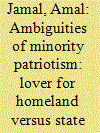

|
|
|
| 3 |
ID:
080931
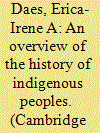

|
|
|
|
|
| Publication |
2008.
|
| Summary/Abstract |
This paper reflects on the entire consultation and drafting process that resulted in the recent proclamation of the United Nations (UN) Declaration on the Rights of Indigenous Peoples (DRIP) UN General Assembly (GA) resolution 61/295. It discusses the problems the drafters of the declaration faced, including those concerning the definition of the terms 'indigenous' and 'peoples'. It also reviews the formal positions of all the parties concerned in an attempt to explain the new meaning of indigenous peoples' right to self-determination, which was one of the main stumbling blocks of the declaration. It is the conviction of this author (hereinafter UN Chairperson-Rapporteur) that the right to self-determination, as contained in Article 3 of the above-mentioned resolution 61/295, should be duly implemented by all concerned for the benefit of the states, indigenous peoples and the global community as a whole
|
|
|
|
|
|
|
|
|
|
|
|
|
|
|
|
| 4 |
ID:
187445
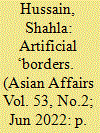

|
|
|
|
|
| Summary/Abstract |
This article focuses on the contested region of Kashmir and investigates how the nation-building project that accompanied the partition of the South Asian subcontinent, along with the creation of the ceasefire line that divided the former princely state of Jammu and Kashmir between India and Pakistan, shaped the question of belonging for the majority of its Muslim inhabitants, especially from the 1940s to the 1960s. It reveals the bureaucratic procedures put in place by the new nation-states, both driven by the question of self-determination pending in the United Nations and devoid of human considerations, made Kashmiris apprehensive about the motivations of both states. The article argues that Kashmiri belonging after partition did not seamlessly merge into the national identities of India or Pakistan. Instead, the anxieties of partition and structural challenges created by the arbitrary ceasefire line shaped Kashmir Muslim perceptions. Drawing from intercepted letters, pamphlets, and biographies, this article reveals the irrelevance of such artificial ‘borders’ in the Kashmiri psyche. In the process, it asserts that the Kashmiri demand for self-determination became intertwined with the desire for the reunification of the old princely state that would promote human-to-human contact, reopen old trade routes, and promote economic self-sufficiency.
|
|
|
|
|
|
|
|
|
|
|
|
|
|
|
|
| 5 |
ID:
082207


|
|
|
|
|
| Publication |
2008.
|
| Summary/Abstract |
Are international standards of democratic governance applied to sub-state actors as well as to states? By examining the international response to self-determination claims, this article demonstrates that the international community does indeed hold sub-state groups accountable to such standards. Claimant groups that have internalised human rights and democratic norms are more likely to receive international support in the form of empowerment (promoting some form of self-governance). Through a comparison of the Kosovars' quest for self-determination with the Nagorno-Karabakh Armenians' claim, the article suggests that 'standards before status' is neither unique to Kosovo nor a deviation from the pre-1999 international response to that claim
|
|
|
|
|
|
|
|
|
|
|
|
|
|
|
|
| 6 |
ID:
190024


|
|
|
|
|
| Summary/Abstract |
Disputes over self-determination (SD) have led to many civil wars, and a primary alternative, nonviolent campaign, is rarely successful in this context. Yet, while secession is rare, these movements often achieve more limited successes in the form of concessions from the state. This article provides a new assessment of the efficacy of different tactics – violent, nonviolent and conventional political action. It advances an argument that nonviolent tactics can help SD movements to generate indirect pressure on states that contributes to movement success, including greater autonomy. Nonviolence is used to garner attention from international actors using a human rights frame for their cause. International actors that are receptive to these human rights narratives then incentivize concessions for the SD movements and dis-incentivize repression. This happens through a variety of means, such as public shaming of the host state and withholding inter-governmental organization membership. Statistical analysis of violent and nonviolent tactics in SD movements shows that nonviolence can be effective in successfully obtaining concessions. Movements that use nonviolence are twice as likely to see concessions in any given year compared to those that just make demands but do not use nonviolence or violence. The effect of nonviolence is slightly larger than that of violence, which is also associated an increased chance of concession.
|
|
|
|
|
|
|
|
|
|
|
|
|
|
|
|
| 7 |
ID:
177662
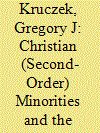

|
|
|
|
|
| Summary/Abstract |
This article explores how a second-order minority, northern Iraq’s Christians, mobilized to protect homelands during state breakdown and state recalibration. It examines how an Iraqi Christian political party, the Assyrian Democratic Movement (ADM), responded to the rise and spread of the Islamic State. More specifically, it analyzes the ADM’s creation of a self-defense force, the Nineveh Plains Protection Units (NPU), and how the party positioned itself for the post-conflict state. Ethnographic fieldwork conducted in Iraq combined with existing primary and secondary sources reveals a detailed process whereby notions of historic homelands were manipulated around security threats and a legacy of distrust of both the central government and Kurdistan Regional Government to drive mobilization. The name “Nineveh Plains Protection Units” also served a strategic purpose. A territorial-based identity connected contemporary Christians to an ancient Mesopotamian past. Combined with a shared Christian faith, this served to supersede intragroup/sectarian cleavages and “the ethnic Assyrian debate” without rejecting them. It also acted as a bridge to the country’s other ethno-sectarian groups, finding a way to assert Assyrian and Christian belonging within and to Iraq. Nevertheless, mobilization and the long-term goal of self-determination in the Nineveh Plain were both ultimately contingent upon allying with either Baghdad or Erbil. Although the ADM chose Baghdad, it was left alone to navigate the Nineveh Plain’s position within the Kurdistan independence referendum.
|
|
|
|
|
|
|
|
|
|
|
|
|
|
|
|
| 8 |
ID:
159371
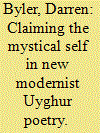

|
|
|
|
|
| Summary/Abstract |
By recuperating the Sufi poetics of the Uyghur past, “avant-garde” Uyghur poets such as Tahir Hamut and Perhat Tursun are claiming a right to speak as heirs to both a religious and a literary tradition. For these modernist poets, finding one’s own way forward through the past is a way of reclaiming the discourse surrounding Uyghur identity, and the cultural symbols built into it, as an extension of the self. By channeling affect in such a way that it appears to derive from conventional Uyghur imagery, these poets demonstrate a measure of self-mastery that restores a feeling of existential security in the midst of political and religious change. This article argues that the purpose of their poems is to force the reader to accept new interpretations of images of Sufi embodiment and spirituality as valid and powerful. It further claims that the new indexing of Sufi imagery in this emerging corpus disrupts the unity of Uyghur poetry in the genres of Chinese Socialist Realism and ethno-nationalist Uyghur tradition, not in a negative process, but in order to create new forms of thought and subjectivity. It forces the reader to interpret the world not by trying to return to mythical Uyghur origins or reaching for a Socialist or an Islamic utopia but instead as a means of self-determination and affirming contemporary life itself.
|
|
|
|
|
|
|
|
|
|
|
|
|
|
|
|
| 9 |
ID:
177698
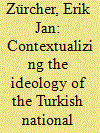

|
|
|
|
|
| Summary/Abstract |
The national resistance movement that emerged in Anatolia and Thrace immediately after the end of World War I and that was eventually successful in overturning the peace settlement imposed on the Ottoman Empire by the victorious Entente, has become such an important part of the history of the emergence of the Turkish nation state, that it is studied almost exclusively in that context: as republican prehistory. As a result almost no effort has been made to locate it within the major global developments of the era. This article tries to remedy this by analysing statements coming out of the resistance leadership over the years 1918-1921 to establish where it fits the ideological currents of the day. It concludes that four major inputs can be discerned: loyalty to the Ottoman monarchy and state; Muslim nationalism; Wilsonian self-determination, and Boslevik-inspired anti-imperialism. These influences were not mutually exclusive. Apart from being influenced by contemporary ideological currents, the National Movement was also an influencer: as a movement to preserve an existing state (and not to create or carve out a new one) it was also a pioneer of the revisionist movements of the interbellum that aimed to undo the Paris peace arrangements.
|
|
|
|
|
|
|
|
|
|
|
|
|
|
|
|
| 10 |
ID:
080932
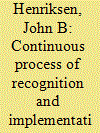

|
|
|
|
|
| Publication |
2008.
|
| Summary/Abstract |
This paper explores the status of the recognition and implementation of the Sami people's right to self-determination. The Sami are the indigenous people of Finland, Norway, Sweden and the Kola Peninsula in the north-western region of Russia. They are one people residing across national borders, enjoying a distinctive identity, language, history, culture and social structure, as well as unique traditions, livelihoods and aspirations. Their distinctiveness has given rise to their claim to self-determination based on conventional principles and instruments of international law. But where their right to self-determination has been gradually recognized by Finland, Norway and Sweden, Russia remains reluctant. And where Sami self-determination has been implemented through indigenous Sami parliaments, in Nordic states, the process of recognizing and implementing their right within these states has only taken place incrementally within existing democratic and constitutional mechanisms. It is a continuous process without a predefined outcome
|
|
|
|
|
|
|
|
|
|
|
|
|
|
|
|
| 11 |
ID:
176047
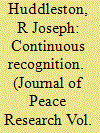

|
|
|
|
|
| Summary/Abstract |
How do self-determination groups move toward diplomatic recognition? Although recognition is the dominant activity used to understand international sovereignty, it is perhaps the most costly decision states make towards these groups. Third parties have many substantial interactions with aspiring states, building their sovereignty by other important means. I argue that our understanding of international sovereignty can be improved by conceptualizing it as a dynamic, continuous process, reflected in foreign policy decisions short of the legal recognition. I create a Bayesian latent variable model of international sovereignty, using bilateral data on diplomatic exchange, IGO voting, sanctions, military aid, and intervention in separatist conflicts. Complementing prior work on international sovereignty, my measure provides support for important theoretical expectations previously explored using only recognition as a measure of sovereignty. I find that diplomatic recognition, extant violence, separatist victory, and sour third-party–incumbent relations positively impact latent sovereignty of separatists, while concern for precedent negatively impacts it.
|
|
|
|
|
|
|
|
|
|
|
|
|
|
|
|
| 12 |
ID:
143571
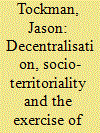

|
|
|
|
|
| Summary/Abstract |
This article analyses the ‘indigenous autonomy’ being constructed in two dozen Bolivian municipalities and territories, in accordance with the 2009 Constitution. It finds that Bolivia’s 1994 decentralisation reforms, which created the country’s system of municipalities, are central to understanding the contemporary implementation of indigenous autonomy. Some indigenous people view as favourable the representative and material gains achieved by municipalisation, which helps explain why more majority-indigenous communities have not yet chosen the new option of indigenous autonomy. However, the new legal framework also limits indigenous self-governance, because territorial delimitations of the country’s municipalities are generally inconsistent with indigenous peoples’ ancestral territories. The new institutions of self-governance are legally obligated to include discrete legislative, executive and administrative functions, reflecting not indigenous norms but a municipal structure of liberal design. This study illustrates the way that indigenous self-determination may encounter obstacles where indigenous territorial jurisdictions must coincide with contemporary boundaries of colonial origins, rather than with pre-colonial territories.
|
|
|
|
|
|
|
|
|
|
|
|
|
|
|
|
| 13 |
ID:
022921


|
|
|
|
|
| Publication |
Fall 2002.
|
| Description |
25-51
|
|
|
|
|
|
|
|
|
|
|
|
|
|
|
|
| 14 |
ID:
046655
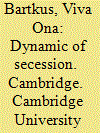

|
|
|
|
|
| Publication |
Cambridge, Cambridge University Press, 1999.
|
| Description |
viii, 246p.
|
| Standard Number |
052165701
|
|
|
|
|
|
|
|
|
|
|
|
Copies: C:1/I:0,R:0,Q:0
Circulation
| Accession# | Call# | Current Location | Status | Policy | Location |
| 045849 | 320.15/BAR 045849 | Main | On Shelf | General | |
|
|
|
|
| 15 |
ID:
143320


|
|
|
|
|
| Summary/Abstract |
Why are some ethnopolitical movements divided while others are relatively unified? A growing literature examines the consequences of internal divisions in ethnopolitical movements – and shows that it matters for a range of conflict outcomes – yet the mechanisms causing such divisions remain poorly understood. Our argument emphasizes competitive dynamics between states and self-determination movements and between rival factions within these movements as key determinants of fragmentation. Drawing from literatures on social movements, contentious politics, and civil war, we situate our argument vis-à-vis three alternative and complementary sets of explanations based on theories emphasizing transnational dimensions, political institutions, and structural factors within ethnopolitical groups. Using an original dataset, we test hypotheses explaining movement fragmentation over time and use a case study of Punjab in India to identify specific causal mechanisms and missing variables. Our findings show some support for three of these theories, suggesting that ethnopolitical movements divide as a result of complex and interactive processes. But our findings also underscore that central to explaining fragmentation dynamics are factors capturing competitive dynamics, including repression, accommodation of movement demands, the turn to violence, and the dynamic and changing nature of ethnopolitical demands.
|
|
|
|
|
|
|
|
|
|
|
|
|
|
|
|
| 16 |
ID:
021215
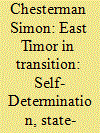

|
|
|
|
|
| Publication |
Spring 2002.
|
| Description |
45-76
|
|
|
|
|
|
|
|
|
|
|
|
|
|
|
|
| 17 |
ID:
064687
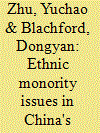

|
|
|
| 18 |
ID:
080816
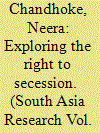

|
|
|
|
|
| Publication |
2008.
|
| Summary/Abstract |
One of the most intractable problems confronting South Asian states and societies has been the presence of secessionist movements and insistent demands for a state of one's own. Though societies and states tend to react violently when faced with such demands, many serious issues are embedded in secessionist demands, as well as in the responses to these demands, above all issues of justice and injustice. The present article seeks to trace out the key issues involved in demands for secession, exploring reasons for why and when such demands arise in the first place. Examined within the wider context of international law, specific scenarios in South Asia are considered to propel a debate about whether secession can be argued to be a right, and in what circumstances. It is proposed that the concept of secession has, in effect, to be extricated from narrow agendas of national security, war against terror, and military strategy, and placed within the wider domain of normative political theory, which can indeed find justifications for demanding secession.
|
|
|
|
|
|
|
|
|
|
|
|
|
|
|
|
| 19 |
ID:
163298
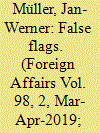

|
|
|
|
|
| Summary/Abstract |
There appears to be one indisputable global trend today: the rise of nationalism. Self-described nationalists now lead not only the world’s largest autocracies but also some of its most populous democracies, including Brazil, India, and the United States. A deepening fault line seems to divide cosmopolitans and nationalists, advocates of “drawbridge down” and “drawbridge up.” And it seems that more and more people are opting for the latter
|
|
|
|
|
|
|
|
|
|
|
|
|
|
|
|
| 20 |
ID:
153698
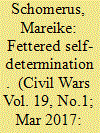

|
|
|
|
|
| Summary/Abstract |
The interpretation of self-determination as a vote for secession shaped the state that South Sudan has become since the 2011 referendum. Self-determination, this paper argues, is a democratic political process in which citizens determine their preferred form of statehood and nature of governance for their country. In South Sudan, however, political actors—with international support—established conditions that reduced such complex democratic processes to narrow technical matters. Equating self-determination with secession consolidated political and military domination in a process designed to end such domination. This was done at the expense of a more inclusive, process-oriented and political interpretation of self-determination.
|
|
|
|
|
|
|
|
|
|
|
|
|
|
|
|
|
|
|
|
|